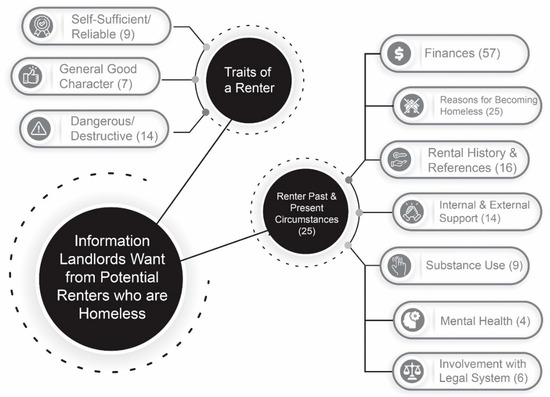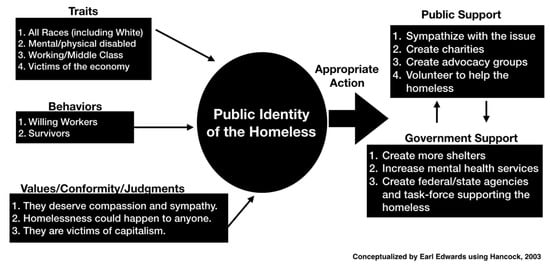The Crisis of Homelessness
Share This Topical Collection
Editor
 Dr. Michele Wakin
Dr. Michele Wakin
 Dr. Michele Wakin
Dr. Michele Wakin
E-Mail
Website
Guest Editor
Department of Sociology, Bridgewater State University, Bridgewater, MA 02324, USA
Interests: urban sociology; poverty; inequality; homelessness
Topical Collection Information
Dear Colleagues,
Homelessness is an increasingly regular feature of life in US cities. It draws the nation’s attention during times of crisis, such as economic recession or natural disaster. The current COVID-19 pandemic is the most recent example of a crisis that highlights various forms of social inequality and stimulates emergency solutions. Using federal funding, states can now implement temporary and permanent housing to ensure social distancing for people experiencing homelessness and determined to be at high risk. This is an unprecedented and much needed resource, as the number of unsheltered homeless people has continued to grow, even before COVID-19. In the 1980s, the crisis of new homelessness also forced emergency solutions, resulting in federal legislation to provide shelter for adults and equal access to public education for homeless children through the McKinney-Vento Homeless Assistance Act (PL100-77). Solutions to homelessness developed during crisis points are often emergency based and limited to specific populations, issues, or time periods. Crisis-driven solutions are important, as they are often the only chance to gain new or greater federal funding and support. Developing long-term solutions is a key concern during crisis points and in urban areas, where homeless people concentrate to gain access to basic needs and shelter services. This concentration is survival-based and poses risks that include criminalization and exacerbating cyclical, generational poverty that ultimately increases homelessness. This Special Issue invites papers that examine innovative approaches to ending homelessness that focus on urban areas, specific populations, or crisis points. Papers that compare the USA with global cities are also welcome
Dr. Michele Wakin
Guest Editor
Manuscript Submission Information
Manuscripts should be submitted online at www.mdpi.com by registering and logging in to this website. Once you are registered, click here to go to the submission form. Manuscripts can be submitted until the deadline. All submissions that pass pre-check are peer-reviewed. Accepted papers will be published continuously in the journal (as soon as accepted) and will be listed together on the collection website. Research articles, review articles as well as short communications are invited. For planned papers, a title and short abstract (about 100 words) can be sent to the Editorial Office for announcement on this website.
Submitted manuscripts should not have been published previously, nor be under consideration for publication elsewhere (except conference proceedings papers). All manuscripts are thoroughly refereed through a double-blind peer-review process. A guide for authors and other relevant information for submission of manuscripts is available on the Instructions for Authors page. Social Sciences is an international peer-reviewed open access monthly journal published by MDPI.
Please visit the Instructions for Authors page before submitting a manuscript.
The Article Processing Charge (APC) for publication in this open access journal is 1800 CHF (Swiss Francs).
Submitted papers should be well formatted and use good English. Authors may use MDPI's
English editing service prior to publication or during author revisions.
Keywords
- homelessness
- urban space
- criminalization
- inequality
Published Papers (4 papers)
2021
Open AccessArticle
Association between Psychological Integration and Permanent Supportive Housing: An Exploratory Study with a Focus on Ethnicity
by
Annette S. Crisanti, Shelley Alonso-Marsden, Leah Puglisi, Richard Neil Greene, Tyler Kincaid, Jenna L. Dole and Neal Bowen
Viewed by 2526
Abstract
There is limited research on the association between Permanent Supportive Housing (PSH) and psychological integration. The purpose of this study was to explore this association among individuals with mental illness and/or substance use disorder (SUD) enrolled in PSH and to identify variables associated
[...] Read more.
There is limited research on the association between Permanent Supportive Housing (PSH) and psychological integration. The purpose of this study was to explore this association among individuals with mental illness and/or substance use disorder (SUD) enrolled in PSH and to identify variables associated with sense of belonging. Given differences in outcomes of PSH by ethnicity, we were interested to determine if an association existed between PSH and psychological integration and whether it was equally observed among Hispanics and non-Hispanics. The target population included individuals who were chronically homeless and diagnosed with a mental illness and/or SUD. Baseline data were collected upon intake (
N = 370). Follow-up data were collected at six-months post baseline (
N = 286) and discharge (
N = 143). Predictor and control variables included demographics, overall health, PTSD symptom severity, interactions with family and friends, and participation in recovery-related groups in the community. Psychological integration scores increased significantly from the baseline to the 6-month follow-up (
t = −3.41,
p = 0.003) and between the 6-month follow-up and discharge (
t = −2.97,
p = 0.007). Significant predictors of psychological integration included overall health, interactions with family and/or friends, PTSD symptoms, income, education, and diagnosis. No differences were observed between Hispanics and non-Hispanics. The findings from this exploratory study suggest that future research in this area is warranted.
Full article
Open AccessArticle
Landlord Perceptions on Homelessness in Northern Utah
by
Jayme E. Walters, Jessica Lucero, Claire Wever and Amber Post
Viewed by 3286
Abstract
Homeless programs often rely on landlord engagement for successful implementation. However, there is very little research that examines landlord perspectives related to homelessness. Better understanding landlords’ opinions and attitudes regarding those experiencing homelessness can inform program development and policy in the efforts to
[...] Read more.
Homeless programs often rely on landlord engagement for successful implementation. However, there is very little research that examines landlord perspectives related to homelessness. Better understanding landlords’ opinions and attitudes regarding those experiencing homelessness can inform program development and policy in the efforts to prevent and mitigate homelessness in the U.S. A 49-question survey was created and administered by social work faculty and students to landlords and property managers throughout the Bear River Region of northern Utah (N = 134). The survey contained a variety of questions that assessed landlord attitudes and knowledge toward those experiencing homelessness as well as their comfortability in renting to these individuals. Results revealed that landlords would like to help solve homelessness in their community, but they do not know where to start. Additionally, results showed that landlords’ willingness to rent to individuals experiencing homelessness is dependent on contextual factors, such as having more information regarding the individual, their income, past rental history, and other factors. Finally, results showed that landlords had biases toward specific groups of individuals experiencing homelessness (e.g., landlords felt more comfortable renting to those with physical disabilities than those with substance misuse histories). Results are discussed in context of program, policy, and research implications.
Full article
►▼
Show Figures
Open AccessConcept Paper
Who Are the Homeless? Centering Anti-Black Racism and the Consequences of Colorblind Homeless Policies
by
Earl James Edwards
Cited by 9 | Viewed by 14909
Abstract
Since first becoming a major social issue in the 1980s, homelessness has been a racialized problem in the United States. Its disproportionate impact on Black Americans is primarily driven by structural racism and the limited housing and employment opportunities for Black Americans. The
[...] Read more.
Since first becoming a major social issue in the 1980s, homelessness has been a racialized problem in the United States. Its disproportionate impact on Black Americans is primarily driven by structural racism and the limited housing and employment opportunities for Black Americans. The first major federal legislation to address the needs of the United States’ homeless population—the Stewart B. McKinney–Vento Homeless Assistance Act of 1987 omitted the root causes of Black housing instability, thereby proving ineffective at mitigating Black homelessness. As a result, Black Americans remain disproportionately impacted today. In addition to being neglected by the McKinney–Vento Homeless Assistance Act, Black men and women experiencing homelessness are more likely to be discriminated against than any other racial group. For example, Black men are more likely to be arrested than anyone else, and Black women are the most likely to experience hyper-surveillance. This paper uses the Public Identity Framework to argue that in the 1980s, advocates and opponents of homeless legislation created two contradictory public personas to shape public discourse and policies for the homeless. A colorblind public persona was used to pass the McKinney–Vento Homeless Act; meanwhile, the public persona of the “underclass” was used to criminalize and shame the homeless. Both personas operated concurrently to create a dual public identity for the homeless that influenced policy and ultimately harmed Black people.
Full article
►▼
Show Figures
Open AccessArticle
Mission Unaccomplished: Impediments to Affordable Housing Drive in Addressing Homelessness in Sub-Saharan Africa
by
Emeka Emmanuel Obioha
Cited by 5 | Viewed by 4518
Abstract
Affordable housing is a people-centered strategy in dealing with homelessness. However, the increasing number of people in need of homes in sub-Saharan Africa suggests that this strategy has not afforded homes to the homeless. Theoretically, affordable housing exists to provide cheap and decent
[...] Read more.
Affordable housing is a people-centered strategy in dealing with homelessness. However, the increasing number of people in need of homes in sub-Saharan Africa suggests that this strategy has not afforded homes to the homeless. Theoretically, affordable housing exists to provide cheap and decent homes, but in contrast, these social houses are practically unaffordable, which raises the question of why this is the case. This paper articulates the impediments that account for unrealized affordable social housing in sub-Saharan Africa. It argues that tackling these impediments through the recommended ways will booster realization of this dream. In conclusion, while provision of affordable housing to all who are in need of homes in various countries in sub-Saharan Africa is a desirable goal, all indications point to the reality that this mission is far from an accomplished status.
Full article







